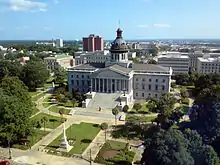Operation Lost Trust
Operation Lost Trust was the name of an FBI investigation into the South Carolina General Assembly from 1989 to 1999. By the end of the investigation, seventeen members of the South Carolina General Assembly were arrested for bribery, extortion, or drug use. Operation Lost Trust is often considered the greatest political scandal in the history of the state of South Carolina. It directly influenced the passing of South Carolina's Ethics Reform Act of 1991 and led to the restructuring of the state government in 1993. In its wake the once dominant South Carolina Democratic Party was weakened as a political party and the Republican Party emerged as a viable political entity in the state.

Investigation
In 1989, the Federal Bureau of Investigation began investigating the South Carolina General Assembly after the narcotics arrest of Ron Cobb, a lobbyist and former member of the South Carolina House of Representatives. The FBI supplied Cobb with a boat located in Hilton Head Island, South Carolina and an office in Atlanta for the purposes of misleading state lawmakers into believing that he represented the Alpha Group, a fake organization seeking support for a bill legalizing dog and horse-track betting. Cobb was instructed to bribe lawmakers with campaign contributions in return for their support for the bill.[1]
In July 1990, a grand jury subpoenaed the campaign finance records of all 170 members of the General Assembly revealing the existence of the investigation.[2] The investigators were looking for self-reported disclosures of the in-total $30,000 that investigators doled out to tempt lawmakers during the election season.[3] Five legislators, including State Representative Robert A. Kohn, were initially indicted for failure to disclose the payments and violating the Hobbs Act. Kohn later agreed to cooperate with prosecutors. While the four indicted members of the General Assembly in the House of Representatives were suspended from official duties, the lone senator, William Richard Lee, was able to continue his work in the South Carolina Senate.
At that time, South Carolina required that state lawmakers report any campaign contributions they received to the respective ethics committee of their governing body. After the initial five indictments made the news, Governor Carroll A. Campbell Jr. and Speaker of the House Robert Sheheen both stated that reforms to this system were in order.[2] Out of the 28 indictments in total (lobbyists were also indicted) only the indictment of Representative Tom Wilkes resulted in a no guilty verdict.[4] The South Carolina Legislative Black Caucus raised concerns about the large number of African American lawmakers charged during the investigation.[5]
Aftermath
Ethics Reform Act of 1991
In response to Operation Lost Trust, state lawmakers passed the Ethics Reform Act of 1991. This act made it illegal for lobbyists to give any gift, including a campaign contribution, to any serving member of the government. It also capped donations from lobbying firms (lobbyists themselves had to be uninvolved in the decision) to $1,000 when it was previously unlimited. The act also regulated how businesses and organizations which employ lobbyists could entertain lawmakers, ensuring that the entertainment was conducted only in formal groups.[6]
Strengthening the governorship
On February 23, 1993, a bill was introduced to the South Carolina House of Representatives to restructure the state government.[7] Up to this point, the governor of South Carolina had largely been a ceremonial figurehead with limited power. However, after Operation Lost Trust, the General Assembly voted to give the governor what was essentially a "third" of its power.[8] According to The State, the main newspaper of Columbia, South Carolina, "the legislation condensed 75 agencies into 17, and let the governor hire and fire the directors of 11.[8] The legislature maintained its power over education, road construction, and environmental regulations while giving the governor power over agencies that imprisoned people, managed healthcare, and collected taxes for the state. South Carolina is still considered a "legislative state" with the General Assembly maintaining a large proportion of power over the governor's appointments as well as the ability to appoint judges.[9]
References
- "Statehouse Report – HISTORY: Operation Lost Trust". Retrieved 2019-05-31.
- Smothers, Ronald; Times, Special to The New York (1990-08-25). "5 South Carolina Lawmakers Indicted in Corruption Inquiry". The New York Times. ISSN 0362-4331. Retrieved 2019-05-31.
- Kropf, Schuyler. "Lost Trust shook state 20 years ago". Post and Courier. Retrieved 2019-05-31.
- "Operation Lost Trust: The Tim Wilkes Story". ABC Columbia. 2014-11-21. Retrieved 2019-05-31.
- "`LOST TRUST' Fant pleads guilty". GoUpstate. Retrieved 2019-05-31.
- Editor, Cindi Ross Scoppe Associate. "What Operation Lost Trust meant to South Carolina". thestate. Retrieved 2019-05-31.CS1 maint: extra text: authors list (link)
- "South Carolina Legislature Online - Bill Search by Bill Number". www.scstatehouse.gov. Retrieved 2019-06-01.
- "Scoppe: 1993 restructuring law gave SC governors their first hint of authority". thestate. Retrieved 2019-05-31.
- "The "Legislative State:" How the General Assembly Controls South Carolina's Government". The South Carolina Policy Council. 2017-10-25. Retrieved 2019-06-01.